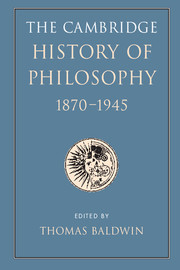Book contents
- Frontmatter
- Contents
- List of contributors
- Introduction
- I 1870–1914
- 1 Positivism, Idealism, and Pragmatism
- 2 Psychology and Philosophy
- 3 Logic, mathematics, and judgement
- 4 Philosophy and the new physics
- 5 The idea of social science
- 6 Ethics, politics, and legal theory
- 18 Utilitarians and idealists
- 19 Nietzsche
- 20 The new realism in ethics
- 21 Individualism vs. collectivism
- 22 Marxism and anarchism
- 23 Legal theory
- 7 Philosophy of religion and art
- Interlude
- II 1914–1945
- Biobibliographical appendix
- Bibliography
- INDEX
- References
19 - Nietzsche
from 6 - Ethics, politics, and legal theory
Published online by Cambridge University Press: 28 March 2008
- Frontmatter
- Contents
- List of contributors
- Introduction
- I 1870–1914
- 1 Positivism, Idealism, and Pragmatism
- 2 Psychology and Philosophy
- 3 Logic, mathematics, and judgement
- 4 Philosophy and the new physics
- 5 The idea of social science
- 6 Ethics, politics, and legal theory
- 18 Utilitarians and idealists
- 19 Nietzsche
- 20 The new realism in ethics
- 21 Individualism vs. collectivism
- 22 Marxism and anarchism
- 23 Legal theory
- 7 Philosophy of religion and art
- Interlude
- II 1914–1945
- Biobibliographical appendix
- Bibliography
- INDEX
- References
Summary
Nietzsche went virtually unnoticed during his productive life, but after his mental collapse in early 1889 his influence increased dramatically although unevenly. He has been a major figure in Europe for virtually the whole of the twentieth century with philosophers and intellectuals such as Vaihinger, Spengler, Jaspers, Heidegger, and later Foucault, Deleuze, and Derrida regarding him as one of the most important philosophers of modern times. His influence on artists and writers has been remarkable. But until the middle of the twentieth Century, philosophers in the English-speaking world tended to regard him with hostility or indifference (Bertrand Russell’s unsympathetic attitude is typical, see Russell 1946). Perceptions of Nietzsche as a thinker worth exploring have risen steadily in the English-speaking world since then, and he is increasingly seen as important in the formation of twentieth-century consciousness. But this is not the emergence of an unruffled consensus, and Nietzsche continues to produce ardent worshippers and vehement revilers in a way unimaginable for the other major philosophers in the Western tradition. Nietzsche passionately wants to influence our approach to life, and no other philosopher places such importance on the affirmation of this world. In part this is a reaction to his early pessimistic philosophical hero, Schopenhauer. The task Nietzsche undertook as his philosophy matured was the revaluation of all values (Nietzsche 1882: §269).
- Type
- Chapter
- Information
- The Cambridge History of Philosophy 1870–1945 , pp. 266 - 276Publisher: Cambridge University PressPrint publication year: 2003



